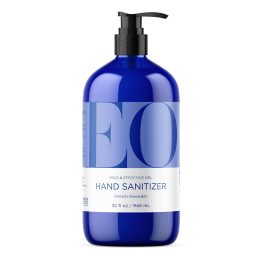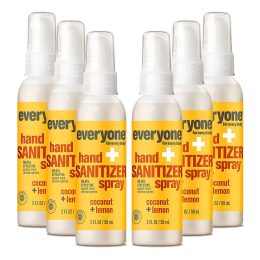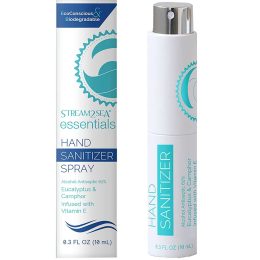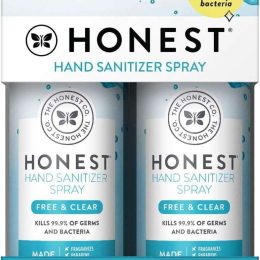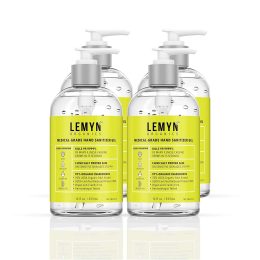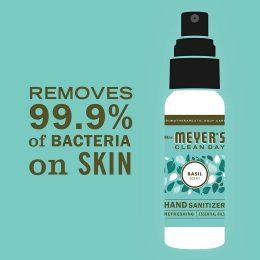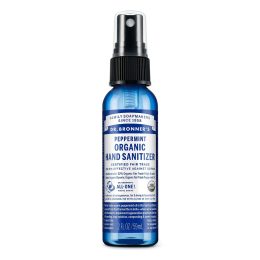Organic & Eco-Friendly Hand Sanitizers
With various viruses around, experts recommend washing hands often. As per Centers For Disease Control and Prevention (CDC), The most effective way to kill germs is to wash your hands with soap and water. Soap and water reduce the amount of different types of germs on your hands. Hand Sanitizers should be an option only when you are in a situation where water and soap are not available. Hand sanitizers have been proven to kill bacteria, but they also have a dangerous side as they are made of chemicals and high percentage of Alcohol contents in it. Non-Alcohol based Hand Sanitizers available in the market can kill effectively a broader range of viruses, bacteria and fungi. Many alcohol-free hand sanitizers use antimicrobial Benzalkonium chloride instead of alcohol which is known as human toxicant or allergen. It is also a skin and eye irritant. Prolonged or repeated skin contact with benzalkonium chloride may cause dermatitis. Organic hand sanitizers use Organic Ethanol and Essential Oils. Many Organic and Eco-Friendly Hand Sanitizers use lavender essential oils and Aloe vera which contain active ingredients that have natural anti-bacterial and anti-viral properties and also goes good on skin. At Buyeko, you can find various Natural Organic & Eco-Friendly Hand Sanitizers, sprays which are good for your skin and Planet!!!
Get to Know your Hand Sanitizers: Alcohol vs Chemical based Non-Alcohol vs Organic
With various viruses around, experts recommend washing hands often. However, when you are on the go, washing your hands is not always an option. Hand sanitizers seem like a good idea when you find yourself in a dirty situation. Just whip out your hand sanitizer and squeeze out a glop. Hand sanitizers have been proven to kill bacteria, but they also have a dangerous side as they are made of chemicals and high percentage of Alcohol contents in it.
As per Centers For Disease Control and Prevention (CDC), The most effective way to kill germs is to wash your hands with soap and water. Soap and water reduce the amount of different types of germs on your hands. Hand Sanitizers should be an option only when you are in a situation where water and soap are not available.
According to the Centers For Disease Control and Prevention (CDC), many studies found that sanitizers with at least 60 percent alcohol are more effective at killing germs than sanitizers with low alcohol content or no alcohol. Hand sanitizers with less than 60% alcohol may not work as well as the ones with higher alcohol content and kill germs. Alcohol based Hand Sanitizers uses Ethanol as active Ingredient. The problem is after using these sanitizers for several days, consumers notice that their hands become dry and cracked. The alcohol strips off the natural oil of the skin. As consumers’ buying habits are evolving and more informed about the risks associated with using alcohol- based sanitizers; more and more people are looking for alcohol -free, hand sanitizers.
Non-Alcohol based Hand Sanitizers available in the market can kill effectively a broader range of viruses, bacteria and fungi. Many alcohol-free hand sanitizers use antimicrobial Benzalkonium chloride instead of alcohol. Benzalkonium chloride is used in most alcohol-free hand sanitizers. Alcohol-free hand sanitizers usually come in water-based foam. They contain 0.1% concentration of Benzalkonium and water, and many of them contain a skin conditioner and vitamin E to moisture your hands. According to Environmental Working Group (EWG), benzalkonium chloride is a known human toxicant or allergen. It is also a skin and eye irritant. Prolonged or repeated skin contact with benzalkonium chloride may cause dermatitis. However, alcohol-free sanitizers are easier on your hands and do not dry out your hands and they continue to provide protection after applying the sanitizer.
According to a study from University of Missouri, Hand Sanitizers enhances the penetration of BPA by 2 times into your body. Almost all of hard plastics we use on regular basis and food containers has BPA in it which can get into your body if you Hand Sanitizers before taking food.
So now the question is can we avoid Alcohol based or chemical based Non-Alcohol sanitizers and still be protected from Virus, Bacteria and Fungi? The answer would be YES, it is possible.
Organic hand sanitizers use Organic Ethanol and Essential Oils. Many Organic Hand Sanitizers also use lavender essential oils and Aloe vera which contain active ingredients that have natural anti-bacterial and anti-viral properties and also goes good on skin.
In summary, many experts recommend alcohol-free hand sanitizers over alcohol-based hand sanitizers, but the best choice would be to use organic hand sanitizers which are made of organic ingredients which are effective and safe. However, washing hands with soap is always a great option.

